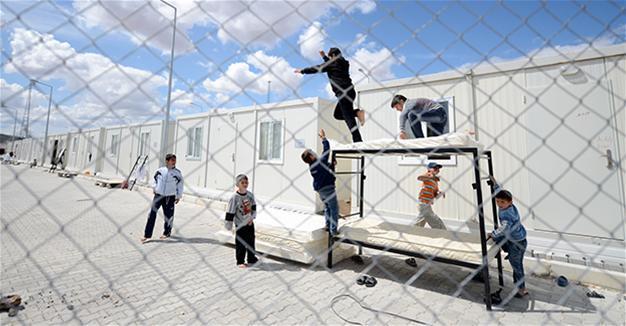EU to allocate 3 billion Euros for refugees by 2017: EU envoy
Sevil ERKUŞ - HATAY
 Following the meeting between President Recep Tayyip Erdogan and European Union officials in Brussels on May 25, at which the parties agreed to resume bilateral dialogue after months of strain, diplomatic traffic between and Ankara and Brussels is again gaining momentum. As part of these efforts, EU Commissioner for Humanitarian Aid and Crisis Management Christos Stylianides will pay a visit to Ankara on June 7 in order to launch a new EU project for Syrian refugees in Turkey.
Following the meeting between President Recep Tayyip Erdogan and European Union officials in Brussels on May 25, at which the parties agreed to resume bilateral dialogue after months of strain, diplomatic traffic between and Ankara and Brussels is again gaining momentum. As part of these efforts, EU Commissioner for Humanitarian Aid and Crisis Management Christos Stylianides will pay a visit to Ankara on June 7 in order to launch a new EU project for Syrian refugees in Turkey.The 3 billion-euro fund for the 2016-17 term, which Brussels proposed to help Syrian refugees in Turkey, will be contracted by the end of year, EU Ambassador to Ankara Christian Berger told the Hürriyet Daily News on June 6.
“By the end of this year, we will know exactly what we are doing with these three billion euros and we will have contracted almost the entire amount of money by the end of this year,” Berger said.
Berger said the issue was discussed at the May 25 meeting between European Commission President Jean-Claude Juncker, European Council President Donald Tusk and Erdoğan.
“For the last 10 months there has been debate about what EU is doing in response to the refugee crisis,” he said, pointing to the bureaucratic burden and complexity of the process for the allocation of the fund in response to complaints from the Turkish authorities. He stressed that despite the red tape, the allocation of EU funds in Turkey was the best in terms of speed and amount compared to his experience elsewhere in the world so far.
The money is part of the EU-Turkey migration deal of March 2016 meant to stop asylum seekers from reaching Greece.
The migrant deal saw Turkey promised aid, visa-free travel for its nationals and accelerated EU membership talks in return for its help in reducing the flow of migrants crossing to Europe.
“I have been working for the European Commission for 20 years. What we have done last year and two months since March 2016 I’ve never seen anywhere else in the world, in terms of speed and the money that is spent and contracted,” Berger stated.
“The requirements and the bureaucracy are heavy. Our responsibility and accountability vis a vis member states and parliaments is very time consuming. It also has to be done hand in hand with the Turkish administration. We have two administrations that have to match up. So from the administrative point of view it’s a heavy operation,” he added.
Berger recalled that the return of Syrian refugees in Turkey will take time, referring to worldwide statistics from the UNHCR that the average return of refugees takes 15 years.
“One of the reasons why many of the Syrians stay in Hatay is because it’s very close to home. I’m pretty sure that many of those people will go home in the end,” he said.
Berger was in Hatay for the handover of EU purchased medical equipment worth 220,000 euros to a migrant health center as part of an International Organization for Migration (IOM) project.
The center also provides training for Syrian doctors and nurses as part of a project implemented by the World Health Organisation (WHO) and funded by the EU. On average, 300 migrants receive medical consultations daily at the center, while a total of 368 Syrian doctors and 320 nurses have already finalized their training at the center and have been assigned to Migrant Health Centers across the country.
















